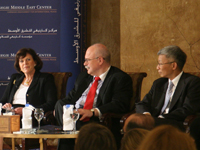Registration
You will receive an email confirming your registration.
The Middle East has long been a regional battlefield of competing interests among the great powers. In the current international environment, however, the United States, Russia, and to a lesser extent China, all have multiple interests in the region.
At an international symposium organized by the Carnegie Middle East Center and aired in two parts on Al Jazeera English’s Inside Story, Carnegie’s Jessica Mathews, Dmitri Trenin, and Minxin Pei spoke about international perspectives on the Middle East. Abdlatif Al-Hamad, director of the Arab Fund for Social and Economic Development and Chairman of the Advisory Board of the Carnegie Middle East Center, gave the opening speech.
Part 1: A new approach to the Middle East?
Challenges to Development
Al-Hamad discussed three main challenges facing development in the Arab world, including:
- Demographics: The major challenge to Arab development is population growth, which has a direct impact on unemployment rates and poverty levels in the Arab world.
- Unemployment: Unemployment is partially due to the failure to reform Arab educational systems, which are not producing graduates who are trained and prepared for the local or international labor markets.
- Water Scarcity: The Arab region, from the Gulf to Mauritania, counts over three hundred million people, and has only 0.5 percent of total global water resources. Al-Hamad argues that Arabs are using water as if it’s an endless resource, while its scarcity represents a serious challenge to Arab states and people.
The Peace Process
Mathews and Pei suggested that the United States and China had differing views on the role their governments should play in the Israeli-Palestinian peace process:
- The United States and Israel: Mathews argued that the current divisions between the United States and Israel are unprecedented in the past two decades; but the Obama administration is not necessarily capable of pressuring the Israeli government into moving forward in the peace process.
- China: Pei stated that Beijing “has no interest in the Israel-Palestine question and sees no benefit in engaging in the peace talks between the Israelis and the Palestinians.”
Part 2: What role for China and Russia in Middle East peace?
Russia’s Political Interests
Trenin reviewed Russia's political and economic situation, arguing that Moscow’s interest in the Middle East is limited. Russia’s regional focus is instead on the Caucasus and Central Asia.
- U.S. Influence: Trenin suggested that although Russia has political and economic interests in the region, in the post- Cold War era, the Middle East is perceived as an American sphere of influence. Russia, he said, does not aspire to challenge the U.S. role there.
- A ‘Zero-sum’ Game: Trenin argued that the United States and Russia’s interests in the Middle East had grown closer together in the past years. “Geopolitical interests in the Middle East,” he stated, “are no longer a zero-sum game.”
China’s Economic Interests
Pei described China's interest in the region as primarily economic. He argued that China has a network of good relations with all parties in the Middle East, and considers the region to be a vital source of oil and gas.
Iran
Iran’s nuclear ambitions have proven to be a source of tension between the United States, Russia, and China.
- Russia: Trenin concluded that relations between the Russian leadership and the Obama administration are significantly improving, which has a profound influence on both nations’ policies towards the Iranian nuclear program.
- China: Pei suggested that while Beijing prefers not to cut its economic ties with Iran, the Chinese leadership is moving towards participation in the sanctions resolution against Iran. He explained that this is a result of China’s strong economic interests in the United States and Europe, as well as the lack of progress in negotiations with Tehran.
